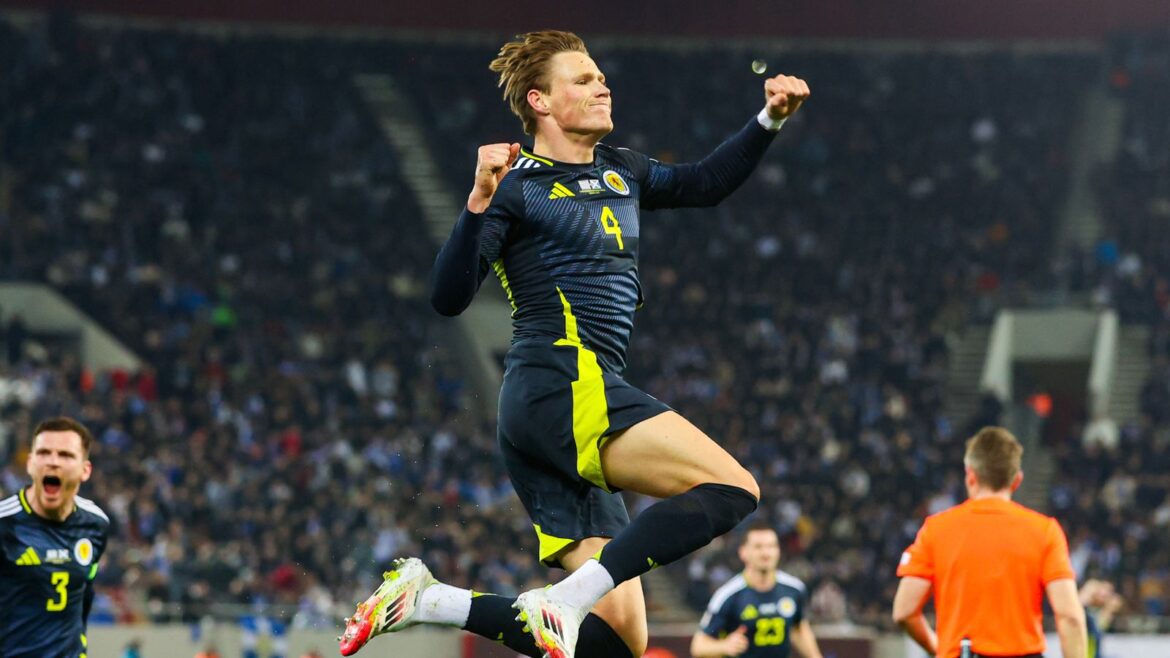Scott McTominay’s
Scotland secured a critical 1-0 victory over Greece in the first leg of their Nations League quarter-final, thanks to a controversial penalty and the intervention of VAR, which played a pivotal role in the outcome. Steve Clarke’s side are now in a strong position to retain their spot in the Nations League’s top tier, but the victory was far from straightforward, as Greece dominated large portions of the second half and were denied a potential equalizer by technology.
Controversial Penalty Puts Scotland Ahead
The match saw Scotland take the lead in controversial circumstances. A challenge from Lazaros Rota on Scott McTominay in the penalty box led to referee Tobias Stieler pointing to the spot. Initially, it appeared that McTominay was brought down, but upon reviewing the incident, VAR found conflicting evidence: one replay showed McTominay being fouled, while another suggested the Scotland midfielder initiated the contact.
Despite the confusion, VAR upheld the original decision, and McTominay confidently stepped up to convert the penalty, silencing the home crowd, who were using laser pens to distract him. The goal marked McTominay’s 11th strike in his last 22 appearances for Scotland, continuing his fine run of form.

While the penalty sparked debate, it gave Scotland a slender 1-0 lead, a margin they managed to hold onto despite Greece’s second-half dominance.
Scotland’s Solid First Half, But Greece Fights Back
The first half was largely under Scotland’s control. Clarke’s side could have been two or three goals up by the break, with Che Adams missing two good chances before halftime. The closest Greece came to scoring was a free-kick from Kostas Tsimikas that landed on the roof of the net. Scotland’s defense held firm, and goalkeeper Craig Gordon wasn’t called into action during the opening 45 minutes.

However, Greece came out much stronger after the interval, pressing high and creating numerous opportunities. Konstantinos Karetsas, a highly-rated teenage substitute, led the charge as Greece had seven shots in the first 15 minutes of the second half.
The hosts thought they had equalized when Christos Tzolis found the net, but the goal was ruled out after it was determined that the ball had gone out of play before the cross. Despite the setback, Greece continued to attack, and Tzolis came agonizingly close to scoring, but his close-range effort hit the post, with replays showing that Anthony Ralston’s slight touch had helped put him off.
Late Drama as VAR Denies Greece a Penalty
The match saw more late drama when Greece were awarded a penalty in the final stages. Taxiarchis Fountas was brought down by Scotland’s Grant Hanley, and the referee initially pointed to the spot. However, VAR intervened once again, and after reviewing the footage, it was determined that the contact occurred just outside the penalty area. The penalty was overturned, and Greece were left frustrated.

This final VAR decision helped Scotland protect their slim 1-0 lead, ensuring they go into the second leg at Hampden Park with an advantage. The winner on aggregate will secure a place in League A of the Nations League.
Steve Clarke Reflects on the Performance
After the match, Scotland’s head coach Steve Clarke reflected on his team’s performance, acknowledging that the first half was a solid one for his side, but that they needed to improve in the second half. “We knew it would be a tough game. First half we were really good, we could’ve been two in front. If I’m being greedy I could say three,” said Clarke.
“We knew Greece would come at us in the second half. We didn’t quite manage to regain our rhythm, so we had to show a different side to our game,” Clarke added. He also praised his defenders, including Anthony Ralston and Grant Hanley, who stepped in despite not playing regularly for their respective clubs.
“We were under a lot of pressure, but it wasn’t like Craig [Gordon] was making save after save,” Clarke said. “But this game is not dead yet. No way.”
Defensive Debate Rages On
The ongoing debate over Scotland’s defensive setup. Clarke had to make a decision on whether to play a back three or a back four, especially with Kieran Tierney’s return from injury. The first half showed the benefits of a back four, with Scotland looking comfortable and dominating possession.
However, the second half raised questions about whether Scotland might be better off with a back five to cope with intense pressure. Greece’s attacking surge highlighted some defensive vulnerabilities, and had it not been for VAR, the result could have been very different.
Despite missing key players like Ryan Christie, Angus Gunn, Lyndon Dykes, and Ben Doak, Scotland managed to secure an important win with a squad that has depth and options. Clarke’s team will now look to finish the job at Hampden Park in the second leg, with a place in League A of the Nations League still very much up for grabs.
With the victory, Scotland is one step closer to securing a spot in the top tier of the Nations League, and the result strengthens their qualification hopes for future tournaments. The future is looking bright for Clarke’s men as they continue to prove their resilience on the international stage.
